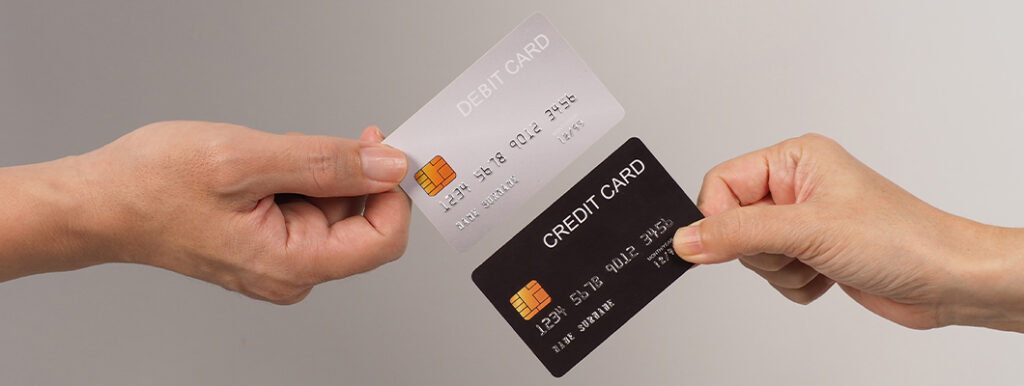The great American money dilemma: Credit vs. debit what truly fits your wallet?
Money makes the world go round, but how you spend it can shape your financial future. In the U.S., the debate between credit and debit cards is ongoing—both have their fans, their perks, and their pitfalls.
Some people swear by credit for the rewards and security, while others stick with debit to avoid debt traps. So, which one actually makes sense for you? Let’s break it down.
Understanding the basics: How credit and debit cards work

At first glance, credit and debit cards look the same. They’re both plastic (or metal, if you like fancy things), they both swipe or tap, and they both pay for your purchases. But beneath the surface, they operate in very different ways.
- Debit cards pull money directly from your checking account. If you don’t have enough funds, the transaction gets declined (unless you have overdraft protection, which is another conversation).
- Credit cards work like a short-term loan. Your bank lets you borrow up to a certain limit, and you pay it back later—either in full or over time with interest.
Now, the real question: which one is the smarter choice for Americans today?
The perks of credit cards: Why they might be your best bet
There’s a reason why credit cards dominate American wallets. They offer plenty of benefits that can make everyday spending more rewarding and financially strategic.
1. Building and boosting your credit score
A good credit score is key to unlocking better interest rates, loan approvals, and even some jobs or apartments. Since debit cards don’t contribute to your credit history, using a credit card responsibly (paying on time and keeping balances low) can help you establish or improve your score.
2. Cashback, points, and travel rewards
Credit card companies want your business, so they offer incentives—cashback on groceries, points for flights, or discounts at your favorite stores. Debit cards? Not so much. While some offer small perks, they can’t compete with the massive rewards programs credit cards provide.
3. Stronger fraud protection
Federal law caps your liability at $50 if your credit card is stolen and misused, but most issuers offer zero-liability policies. Debit cards, however, come with more risk. If fraud happens and you don’t report it quickly, you could lose all the money in your account.
4. Emergency financial cushion
Life happens. Unexpected expenses pop up, and sometimes your checking account isn’t enough to cover them. A credit card gives you a buffer, allowing you to handle emergencies without draining your savings.
5. Safer for big purchases and travel
Hotels, car rentals, and even some online stores prefer credit cards because they offer better protection and security. If you need to dispute a charge, credit card companies are much more consumer-friendly than banks handling debit transactions.
6. Purchase protection and extended warranties
Many credit cards offer purchase protection, meaning if an item is lost, stolen, or damaged shortly after buying it, you may get a refund or replacement. Some cards also extend manufacturer warranties, saving you money on costly repairs or replacements.
The advantages of debit cards: When they make more sense
For all the hype around credit cards, debit cards have their place—especially for those who want to keep things simple and avoid the pitfalls of debt.
1. No risk of debt or interest charges
One of the biggest dangers of credit cards is overspending and falling into debt. With debit, you’re spending only what you have, meaning no late fees, no high-interest payments, and no risk of racking up thousands in debt.
2. Easier budgeting and money management
Since debit cards pull directly from your bank account, they force you to live within your means. It’s a great way to keep spending in check without worrying about due dates, statements, or minimum payments.
3. No annual fees or complicated terms
While some premium credit cards charge high annual fees, debit cards are usually free (unless your bank charges maintenance fees). There’s no fine print, no rewards structure to track—just simple, straightforward spending.
4. Ideal for everyday purchases
For small, routine expenses like coffee runs or gas fill-ups, a debit card works just fine. You don’t have to think about credit limits or bill cycles—just swipe, tap, and go.
5. No credit check required
Not everyone qualifies for a credit card, especially those with low credit scores or no credit history. Debit cards, on the other hand, are available to almost anyone with a checking account. No applications, no denials—just instant access to your money.
The downsides: What to watch out for
No financial tool is perfect. Both credit and debit cards come with their own risks, and knowing them can help you avoid trouble.
Credit card pitfalls
- High interest rates if you carry a balance.
- Temptation to overspend and fall into debt.
- Some cards charge annual fees or foreign transaction fees.
Debit card dangers
- Less fraud protection—if someone drains your account, recovering funds can take time.
- No credit-building benefits, which can be a drawback if you plan to take out loans in the future.
- Some banks charge overdraft fees if you accidentally spend more than you have.
So, which one is better for Americans?
It all comes down to your financial habits and goals.
- If you’re responsible with payments, want rewards, and need to build credit, a credit card is your best bet.
- If you prefer a debt-free, no-fuss approach to spending, a debit card keeps things simple.
- For maximum benefits, using both strategically—credit for bigger purchases and rewards, debit for small, everyday spending—could be the smartest move.
When should you use both?
A balanced approach can offer the best of both worlds. Here’s how:
- Use your credit card for major purchases (travel, electronics, online shopping) to earn rewards and get extra protection.
- Pay your monthly bills with credit to build a positive payment history—just be sure to pay the balance in full.
- Use your debit card for everyday expenses like groceries or coffee, keeping your budget in check without worrying about interest rates.
Final thoughts: Making the right choice for your lifestyle
The debate between credit and debit isn’t about which one is objectively better—it’s about what fits your needs. A college student with no credit history? A starter credit card is a good idea. Someone recovering from debt? A debit card might be the safer bet.
At the end of the day, financial success isn’t about the card you carry—it’s about how you use it. Whether credit or debit, smart money habits will always be the ultimate key to financial freedom.
I'm a student who lives in Rio Grande do Sul, who loves to read and takes advantage of her spare time to catch up on her reading and watch my K-dramas.





